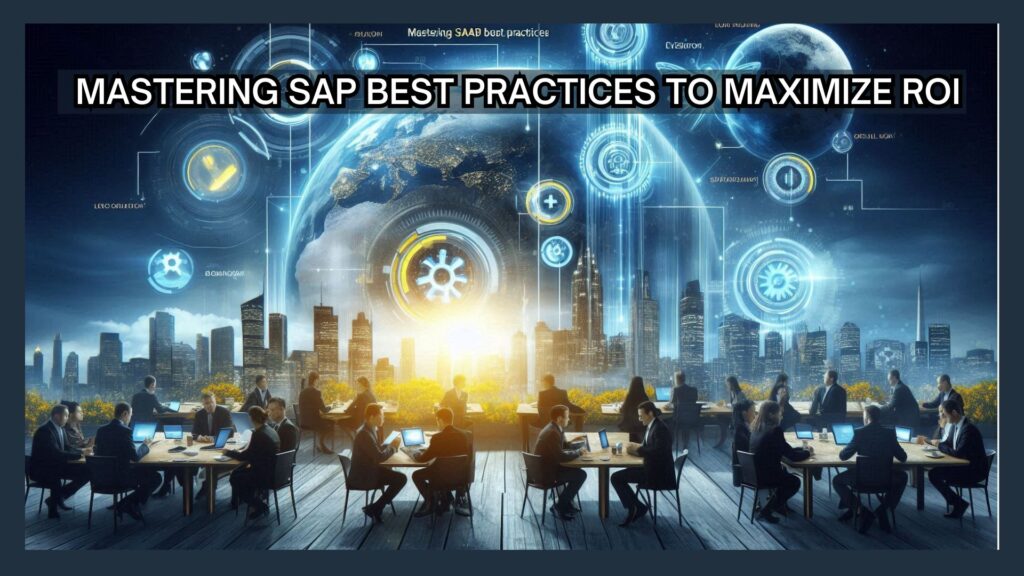Table of Contents Show
SAP software offers many tools and functionalities to streamline business processes. However, to truly maximize its potential and achieve a significant return on investment (ROI), it’s very important to adhere to best practices. This blog post will discuss the key strategies and tips to help you optimize your SAP implementation and reap maximum benefits.
Understanding the Basics: Key SAP Modules
SAP ERP: The backbone of most organizations, providing a comprehensive suite of modules for finance, HR, logistics, and more.
SAP S/4HANA: The latest generation of SAP ERP, built on the in-memory database platform, offering real-time insights and advanced analytics capabilities.
SAP SuccessFactors: A cloud-based human capital management (HCM) solution for managing the entire employee lifecycle.
SAP Ariba: A procurement and supply chain management solution for sourcing, procurement, and invoicing.
SAP C/4HANA: A suite of customer experience solutions, including sales, service, marketing, and commerce.
Core SAP Best Practices for Maximum ROI
-
Clear Business Objectives:
-
-
- Define clear, measurable goals for your SAP implementation.
- Align the project with your overall business strategy.
- Involve key stakeholders from the beginning to ensure buy-in.
-
-
Robust Project Planning:
-
- Create a detailed project plan, including timelines, milestones, and resource allocation.
- Establish effective communication channels to keep everyone informed.
- Use project management tools to track progress and identify potential risks.
- Data Quality and Migration:
- Ensure data accuracy and completeness before migration.
- Cleanse and standardize data to avoid issues during and after the implementation.
- Test data migration thoroughly to identify and rectify errors.
- User Training and Adoption:
- Provide comprehensive training programs to empower users.
- Offer ongoing support and assistance to address questions and concerns.
- Encourage user adoption through incentives and gamification techniques.
- Configuration and Customization:
- Keep customizations to a minimum to reduce complexity and maintenance costs.
- Use standard SAP configurations whenever possible.
- Involve experienced SAP consultants to ensure optimal configuration.
- Testing and Quality Assurance:
- Conduct rigorous testing at various stages of the implementation.
- Identify and fix bugs and performance issues before going live.
- Use test automation tools to streamline the testing process.
- Go-Live and Post-Implementation Support:
- Develop a well-defined go-live plan to minimize disruptions.
- Provide post-implementation support to address any issues and ensure smooth operations.
- Establish regular review and improvement processes.
Advanced SAP Best Practices for Optimization
-
Leverage SAP Analytics:
-
- Utilize SAP Analytics Cloud to gain valuable insights from your data.
- Create interactive dashboards and reports to monitor key performance indicators (KPIs).
- Use predictive analytics to forecast future trends and make data-driven decisions.
-
Embrace Automation:
-
- Automate repetitive tasks using workflow automation and robotic process automation (RPA).
- Improve efficiency and reduce human error.
- Focus on high-value activities that require human judgment.
-
Optimize User Experience:
-
- Design user-friendly interfaces and workflows.
- Provide intuitive navigation and easy-to-understand instructions.
- Train users on best practices to maximize productivity.
-
Stay Updated with SAP Innovations:
-
- Keep up with the latest SAP releases and updates.
- Implement new features and functionalities to enhance your SAP solution.
- Consider cloud-based solutions for greater flexibility and scaleability.
-
Partner with Experienced SAP Consultants:
-
- Engage with experienced SAP consultants to guide your implementation.
- Benefit from their expertise and best practices.
- Consider outsourcing non-core SAP activities to reduce costs and improve efficiency.
To truly experience the full potential of SAP and achieve maximum ROI, consider partnering with a trusted SAP consulting firm like Flexytie. They can provide expert guidance, tailored solutions, and ongoing support to make sure your SAP journey is successful.
The Takeaway
By following these tips and partnering with the right experts, you can maximize the ROI of your SAP investment. A successful SAP implementation requires a combination of technical know-how, strategic planning, and a focus on user adoption.

